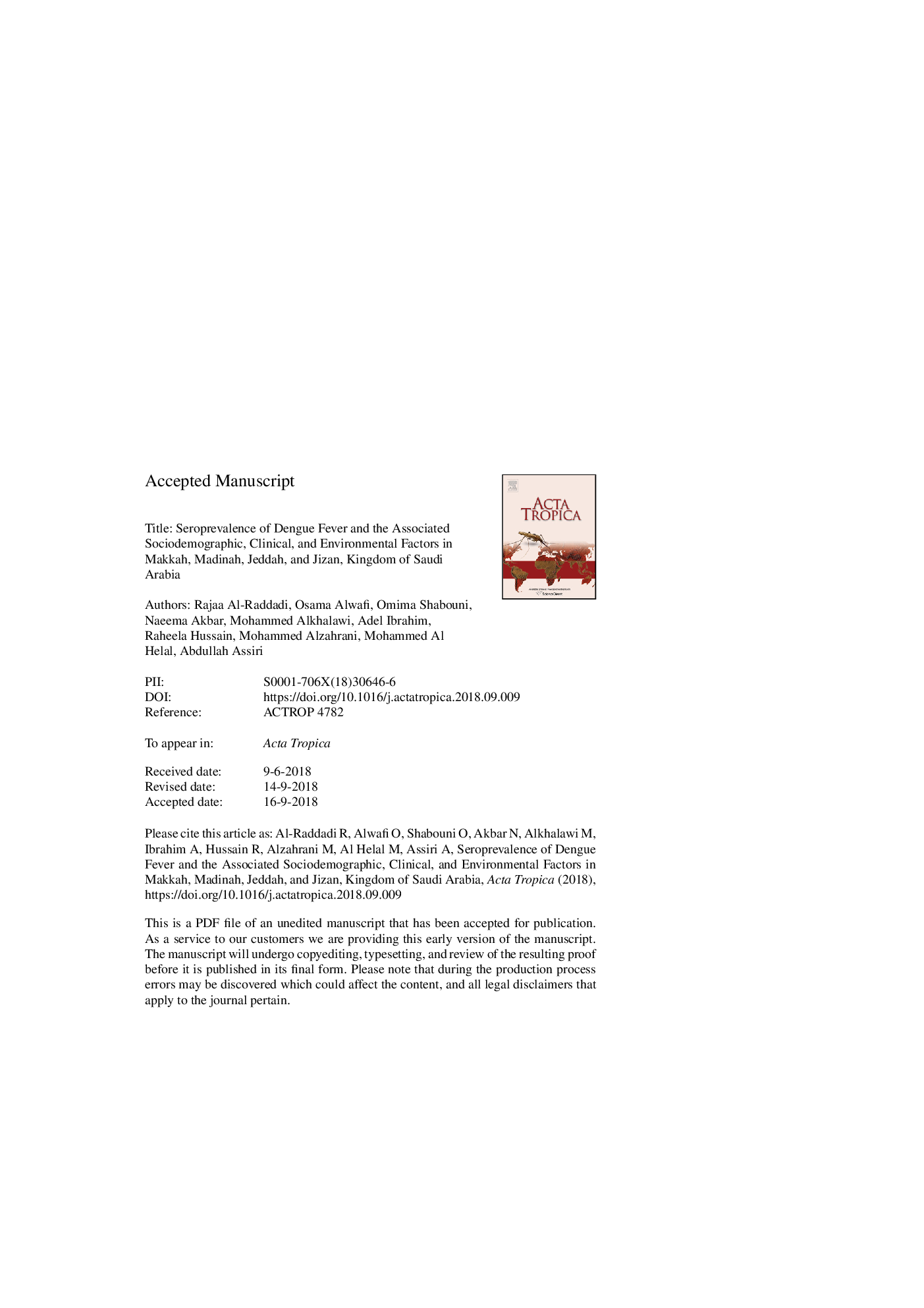| کد مقاله | کد نشریه | سال انتشار | مقاله انگلیسی | نسخه تمام متن |
|---|---|---|---|---|
| 11018398 | 1719661 | 2019 | 51 صفحه PDF | دانلود رایگان |
عنوان انگلیسی مقاله ISI
Seroprevalence of dengue fever and the associated sociodemographic, clinical, and environmental factors in Makkah, Madinah, Jeddah, and Jizan, Kingdom of Saudi Arabia
ترجمه فارسی عنوان
میزان شیوع سندرم نفروپاتی و عوامل مرتبط با آن در جامعه مهاجران، بالینی و محیطی در مکه، مدینه، جده و جیزان، پادشاهی عربستان سعودی
دانلود مقاله + سفارش ترجمه
دانلود مقاله ISI انگلیسی
رایگان برای ایرانیان
کلمات کلیدی
DSSDHSCLSINS1Dengue hemorrhagic fever - تب خونریزی دهنده دنگDengue fever - تب دنگیGPS - سامانه موقعیتیاب جهانیSeroprevalence - سرولوژیDengue shock syndrome - سندرم شوک دنگیGlobal Positioning System - سیستم موقعیت یاب جهانیSaudi Arabia - عربستان سعودیnonstructural protein 1 - غلظت پروتئین 1Community-based - مبتنی بر جامعهClinical and Laboratory Standards Institute - موسسه استاندارد های بالینی و آزمایشگاهی
موضوعات مرتبط
علوم زیستی و بیوفناوری
ایمنی شناسی و میکروب شناسی
انگل شناسی
چکیده انگلیسی
This study aimed to estimate the seroprevalence of anti-dengue IgG antibodies in Makkah, Al Madinah, Jeddah, and Jizan; and to identify the associated demographic, clinical, and environmental independent risk factors. A community-based household serosurvey conducted between September 20, 2016 and January 31, 2017. A multi-stage stratified cluster sampling was used to select 6596 participants from Makkah, Madinah, Jeddah, and Jizan. Blood samples were drawn from all participants to detect anti-dengue IgG antibodies. A semi-structured questionnaire was used to collect information on demographic, clinical, and environmental data. Multivariate logistic regression was carried out to identify independent risk factors of dengue seropositivity. The dengue seroprevalence (95% confidence intervalI) was 26.7% (25.6%, 27.8%), with the highest (33.6%) and lowest (14.8%) rates in Jizan and Madinah, respectively, and reaching 50% or more in several districts of the four cities. Demographic predictors of seroprevalence included: dwelling in Makkah (odds ratio [OR]â=â2.19, pâ<â0.001) or Jizan (ORâ=â2.17, pâ<â0.001); older age (ORâ=â3.91, pâ<â0.001 for age>30 years); housing type (ORâ=â1.84 and 1.82, pâ<â0.001 for popular and social houses, respectively); and number of household occupants (ORâ=â0.86 and 0.71 for 6-10 [pâ=â0.042] and 11-20 [pâ=â0.002] occupants, respectively). Environmental predictors included the absence of pest control works in residency area (ORâ=â1.39, pâ=â0.002), presence of mosquitoes in the home (ORâ=â1.39, pâ=â0.001), and absence of awareness campaigns (ORâ=â1.97, pâ<â0.001). One in four inhabitants of the Western region of Saudi Arabia was seropositive for the dengue virus. Implementation of behavior-based educational programs is recommended, involving the population in the identification and eradication of vector sources and promoting appropriate behaviors that prevent the spread.
ناشر
Database: Elsevier - ScienceDirect (ساینس دایرکت)
Journal: Acta Tropica - Volume 189, January 2019, Pages 54-64
Journal: Acta Tropica - Volume 189, January 2019, Pages 54-64
نویسندگان
Rajaa Al-Raddadi, Osama Alwafi, Omima Shabouni, Naeema Akbar, Mohammed Alkhalawi, Adel Ibrahim, Raheela Hussain, Mohammed Alzahrani, Mohammed Al Helal, Abdullah Assiri,
